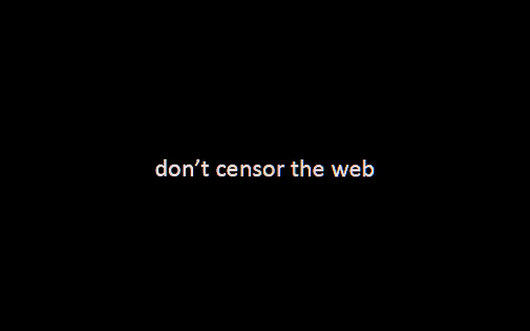
I’m on holiday and posting this from my phone. Let’s all pretend this site is blacked out.
Image credit: Jed Hastwell


I’m on holiday and posting this from my phone. Let’s all pretend this site is blacked out.
Image credit: Jed Hastwell

Family First ordered a poll (something they subsequently left out of their press release) on young people’s views on sex and abortion, and apparently most of them agree with Family First.
The poll was conducted by Curia, David Farrar of Kiwiblog’s market research company. The sample size was 600 15 to 21-year-olds from 6,000 nationwide phone numbers.
“Based on this sample of 600 respondents, the maximum sampling error (for a result of 50%) is +/- 4.1%, at the 95% confidence level.”
Of course, it isn’t actually independent at all because Family First got to choose the wording of the question and options.
Do you think sex education in schools should teach values, abstinence and consequences such as pregnancy, or just teach safe sex?
- Values, abstinence and consequences – 34%
- Just safe sex – 19%
- Both – 42%
- Unsure/refuse – 5%
Safe sex gets ‘just’ put in front of it, but values, abstinence and consequences doesn’t. Did the 34% know they were choosing just values, abstinence and consequences?
Chief executive of Family Planning, Jackie Edmond points out that no organization actually advocates safe sex by itself.
Family First’s spin on this result:
“This is a direct rebuke from young people to the ‘use a condom’ and ‘everyone’s doing it’ messages being pushed by groups like Family Planning, AIDS Foundation and Rainbow Youth,” says Bob McCoskrie, National Director of Family First NZ.
Except, at least 61% support education involving condoms. And ‘everyone’s doing it’ isn’t a message safe sex groups send.
Provided it won’t put the girl in physical danger, should parents be told if their school-age daughter is pregnant and considering getting an abortion?
- Yes – 59%
- No – 34%
- Unsure/refuse – 7%
Without a crystal ball there’s really no way to be sure that it “won’t put the girl in physical danger”. Why not trust the girl’s own judgment? The question suggests that physical danger is the only significant danger. There’s other considerations to be made. Emotional and financial harm, or being chucked out of home are all significant, but none come under physical danger.
“Parental notification laws in Texas, Michigan, Minnesota, and other US states have seen a drop in both the pregnancy rate and the teen abortion rate – a win-win situation for all concerned.”
I’m guessing that quite a few of these abortions have just moved to states with more liberal abortion laws.
Do you believe an unborn child or foetus has a right to be born?
- Yes – 56%
- No – 28%
- Unsure/refuse – 16%
Slightly more young women than young men agreed – 58% to 55%.
The conclusion based on gender is misleading. Slightly more young women than young men disagreed too, 28% to 27%.
Sex education, parental notification, abortion poll results (doc)
Here is Family First’s article on the results (if anything, you should read it to see the words cock, wank, orgasm and clitoris censored with asterisks).
Image credit: Democracy International
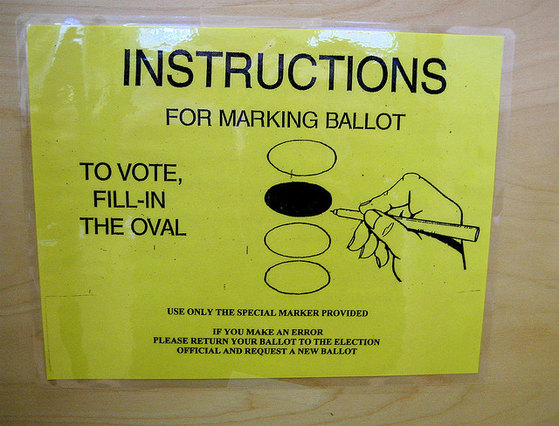
I agree with Graeme Edgeler over at Legal Beagle: you should probably read the Waitakere (Sepuloni/Bennett) recount/judicial review judgment (pdf) by Judge Adams. Graeme calls it 14 pages of democracy.
It’s written in plain English, and it’s no surprise that Judge Adams has a Masters in Creative Writing and has written a book of poems.
“[6] Imagine a large, vacated, open-plan office. It is well-lit, day or night, and there are windows along one side. At one end, it connects, through a door, to another similar room; at the other end, a door connects it to a large kitchen-dining area. It is not flash but the basics are provided. The room is furnished with tables made of cardboard. Four large tables have been created; achieved by pushing six tables together, three on one side and three on the other. Sellotape strips join them together, and ensure that there is no gap into which a slip of paper could disappear. A single cardboard table stands at the head of each large table – this is the place for the table leader. The folding chairs have slightly padded seats. On these seats the counters will sit for several hours each day. This is the Waitakere electorate offìce.”
Some interesting bits from the judgment:
On Election Day I remember having a discussion on Twitter about what happens if it turns out there is more than one vote for a voter. I asked at a polling place but they weren’t too sure either. Basically, the election people find out what happened from the voter, and if they seem legit, they allow their actual vote.
“[22] All the polling place records are collected and a thorough check is made in order to discover if anyone has been given more than one ballot paper; this is referred to [as] “dual votes”. Where dual voting seems to have occurred the Returning Officer conducts a check – even having her staff call to the home of the voter – so that the voter can shed light on the matter. The rule is that dual votes are both disallowed but if enquiry shows that the real voter received only one paper, their vote is allowed.”
Nearly 400 votes weren’t counted because the voters weren’t enrolled to vote.
“[24] … In Waitakere, 393 people who cast votes were found not to be enrolled anywhere so their votes remained unopened, never counted. Those votes did not form any part of the official count.”
A National Party scrutineer wanted the building guarded by police. The judge: “The police were likely to have more productive tasks on hand”.
“[42] At approximately 8:15pm on the Wednesday evening a National Party scrutineer, Mr Mark Brickell, requested that I ask police to guard the building. He submitted that, if word leaked out that the vote seemed closer than the official count, there might be an attempt to interfere with the voting forms. I saw no evidence of any such risk; the suggestion had not been made earlier; the police were likely to have more productive tasks on hand; the building seemed secure. I provided a hand-written decision which gave my reasons. I permitted either party to employ security guards to attend outside the building provided they notified me, and I gave them my cellphone number for that purpose. I received no call. In the morning the ballot papers were still where I had left them.”
Best. Judgment. Ever.
“[47] … My favourite was the voter who emphasised their tick for Carmel Sepuloni by drawing a little orange heart in the rectangle containing her name.”
Or we don’t know that we can get another voting paper if we screw one up?
“[49] … Quite a few voters had made ticks that they had scribbled over with the orange pen, but left a clear tick in another circle, which I took to be a clear indication of their preference. It seems that voters are shy of admitting they have spoiled their paper, because they could easily have obtained another. This might be fruitful area for voter education.”
Christopher Nimmo on the blog post: “But orange is just such a perfect colour for highlighting!”
“[52] … In one, the voter had made a tick for Carmel Sepuloni, and drawn a wavering line through her name. It is possible that the intention was to highlight the choice but I could not exclude the possibility that the voter had struck out her name. For me, this decision is much closer to my line than the previous decision. My level of doubt about whether the line was a change of heart of an emphasis is high; the possibility that a vote was intended is real. Nevertheless, close though it is to the line, I could not be sure that the voter clearly indicated that choice and for lack of clarity I treated it as informal.”
I think this all illustrates that in New Zealand the people dealing with votes actually care.
“I may heartily dislike the results of our latest election, but I couldn’t and wouldn’t dispute its validity. We’re lucky that way.” –Lucy Steward, comment on Legal Beagle.
Image credit: Liz West
 Their reply to “Random” Pak’nSave Bag Searches. No comment on women with handbags or what happens if I did have something in my bag that I had bought from another supermarket.
Their reply to “Random” Pak’nSave Bag Searches. No comment on women with handbags or what happens if I did have something in my bag that I had bought from another supermarket.
Dear Matt,
I can confirm that our bag policy is applicable regardless of a customer’s age and is simply designed to prevent an ongoing shoplifting issue which we are trying to manage. We have a prominent sign in-store which clearly states that ‘We reserve the right to check all bags and may require you to leave large bags with a staff member while shopping.’
While I do appreciate having your bag checked is an inconvenience, unfortunately due to the level of shoplifting we experience in-store, it is an unavoidable part of how we are forced to do business, we would certainly prefer to not check customer’s bags but sometimes even with cameras and other security measures we are left with no option. I apologise if you felt you were unfairly treated and I hope you will continue to shop at my store.
My staff remain committed to giving our customers the best possible shopping experience, and by endeavouring to keep shoplifting to a minimum we hope we can deliver the lowest everyday prices.
Kind regards,
Steven McDonald
Owner
PAK’nSAVE Riccarton
Image credit: Naomi
I wrote about the Ministry of Education’s search and seizure guide for schools a couple of months ago, but I missed this article that contains some really disturbing comments from those involved in education. Basically, the police used to assist schools with draconian drug dog and weapon searches of entire schools, but have stopped after their lawyers realized that they’re probably not legal.

“Education Minister Anne Tolley said a law change might be needed, because it was wrong for the rights of one or two pupils to take precedence over the rights of the whole school community.” [emphasis mine]
Because, you know, it’s only the students with drugs and knives that are being protected by making sure searches are reasonable! As Michael Bott points out later in the article, you’re violating the rights of every student when you conduct unreasonable searches en masse.
“Every step has to be taken to prevent [exposure to drugs and weapons].”
An extremely single-minded approach. When do strip searches become a reasonable step?
“Crown Law is also investigating possible law changes to protect teachers from being charged with assault or false imprisonment”.
“They will still help schools with searches but only when there is evidence of pupils carrying weapons or illicit drugs.”
“Secondary Principals Association president Patrick Walsh – principal of John Paul College in Rotorua – said … it was unfortunate that police would now offer searches only if there was “reasonable suspicion that drugs are being peddled at the school”. The searches should continue until their legality was tested in court or ministry lawyers ruled they were unlawful, he said.” [emphasis mine]
What is this I don’t even.
“‘No other New Zealand citizens are subject to the same intrusive search criteria,’ lawyer Michael Bott said.”
Random drug searches of innocent pupils “were ‘deemed OK by virtue of their age and the fact that they’re compelled to attend the school’”.
Hekia Parata is the new Minister of Education, so hopefully she isn’t as ridiculous as Anne Tolley. Though, Anne Tolley becomes the Minister for Police and Corrections, so good luck with that everyone.
Image credit: U.S. Navy photo by Mass Communication Specialist 1st Class Peter D. Lawlor http://www.flickr.com/photos/anhonorablegerman/5722364868/
Megaupload uploaded a $3 million+ viral video attempt in the form of a song, The Mega Song, to YouTube. Containing endorsements from many musicians that have contracts with Universal Music Group, they weren’t the happiest of campers.
Macy Gray sings in the video, which features will.i.am, P. Diddy, Kanye West, Kim Kardashian (who comes running whenever someone utters the word “endorsement”), Lil John, The Game, Floyd Mayweather, Chris Brown, Jamie Foxx, Serena Williams and Ciara on camera. (Side note: It’s accepted that Chris Brown can do endorsements now?)
Using YouTube’s content management system, which Universal has access to as copyright holders, they took the video down. They didn’t own any content in it. They just didn’t like it.
Now Megaupload aren’t the happiest of campers, and are suing Universal, trying to prevent Universal from interfering with the video, which is now back up, after YouTube appears to have asked Universal as to why exactly they took it down.
Apart from Kim Schmitz/Kim Dotcom, Chief Innovation Officer at Megaupload having a house here in New Zealand where he also has permanent residency (which he celebrated by giving Auckland a $500,000 USD New Year fireworks display), Universal claimed that they took down the video because it contained content from one of their artists, Gin Wigmore.
Wigmore, of course, doesn’t appear in the video at all, in audio or visual form (but was approached to sing in it), so perhaps Universal have forgotten what their artists actually sound like, and mistook Macy Gray for her.
Two takedown notices were received, the second one from will.i.am (well, his lawyer), who appears in the video, saying “When I’ve got to send files across the globe, I use Megaupload”.
Ira Rothken, lawyer for Megaupload, says that written permission in the form of signed Appearance Consent and Release Agreements were provided by everyone in the video, including will.i.am. will.i.am’s signed form, which you can read here (pdf, will.i.am’s real name is William Adams), is pretty convincing.
The Hollywood Reporter has Ken Hertz, will.i.am’s lawyer, says that he “never consented to the ‘Megaupload Mega Song’”. Because he delivered that line to camera for another reason?
Dotcom says that will.i.am assured him that he “had not authorized the submission of any takedown notice on his behalf”.
Universal claim that they can takedown the video under an agreement with YouTube–not the Digital Millennium Copyright Act. In a letter (pdf) to YouTube from Kelly Klaus, a Universal lawyer, says that “As you know, UMG’s [takedown] rights in this regard are not limited to copyright infringement, as set forth more completely in the March 31, 2009 Video License Agreement for UGC Video Service Providers, including without limitation in Paragraphs 1(b) and 1(g) thereof.”
In that case the DMCA’s rules and protections around takedown notices wouldn’t apply. If this is true, YouTube isn’t exactly open about it. They claimed that the video had been taken down by a copyright claim in the message displayed when people tried to watch it:
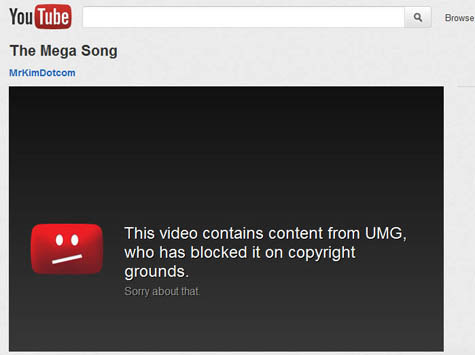
Rothken says “What they are basically arguing, they can go ahead and suppress any speech they want without any consequences. That’s not a workable paradigm”.
This is, perhaps, a huge tick in the column against the Stop Online Piracy Act, which is currently being debated.
Streisand effect, here we come.
Image credit: TorrentFreak
Internet surveillance, censorship, and avenues of resistance with anonymity with Jacob Appelbaum, Researcher and Hacker, The Tor Project.
Go watch Jacob’s talk here.
 Points I found interesting:
Points I found interesting:
Here’s a selection of where stock photos used in mailer six (pdf) are used elsewhere on the internet. Part one of our stock photo adventure is here.
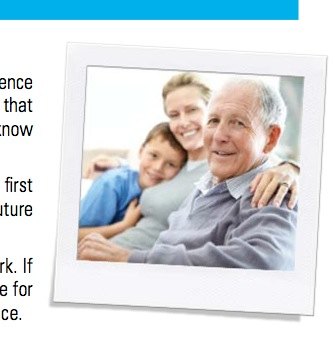
Conservative Party image

—
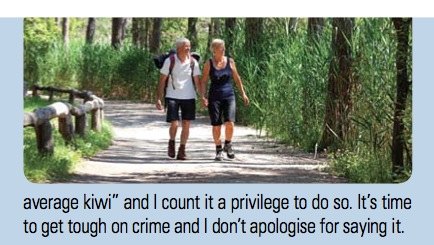 Conservative Party image
Conservative Party image

—
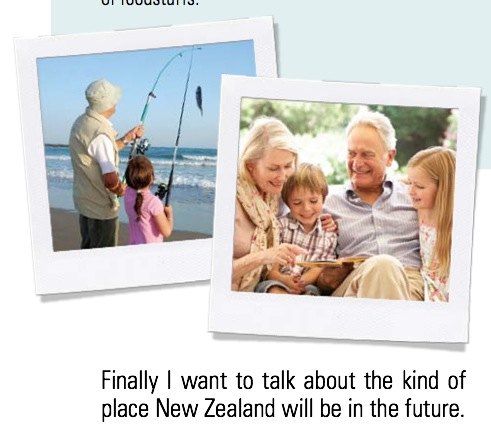 Conservative Party image
Conservative Party image

Quote Alabama Insurance
The ACT Party are using stock images on their Facebook pages. Here’s some from their small business section.
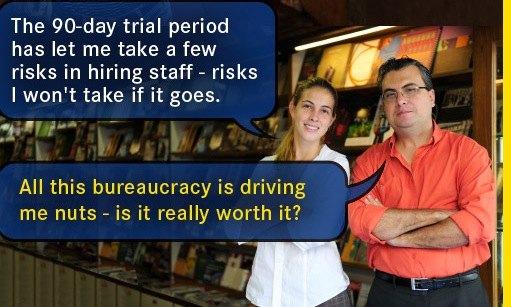 ACT Party image
ACT Party image
 Terrace 139 Creative
Terrace 139 Creative
—
 ACT Party image
ACT Party image
—
And from the Gen Y section.
 ACT Party image (you’d think they’d actually use a New Zealander)
ACT Party image (you’d think they’d actually use a New Zealander)

From their handy ‘How Conservative Are You?’ quiz.
If I have crushed your Conservative Party dreams, and/or you’re not sure who to vote for tomorrow, check this website out.
Update: Teapot tapes have been released, here’s the recording.
There’s a little black
boxbag, yeah,
somewherein the oceanon the table,
holding all the truth about us.
It’s a little blackboxbag,
a record of emotion,
everything that ever was.You may deny it, deny it,
but when I find it, find it,
I’m gonna play it aloud to the world.–Stan Walker

Invite media to a bit of political theater starring you and Other John, public figures, in a public Newmarket café.
Kick media out of said event. But leave some media close enough they could have “leaned over and touched the prime minister on the shoulder”.
Forget what is normally on a table in a café. Ignore the large black thing that could contain anything.
Have a wee chat. Maybe about Don Brash and how he might be rolled after the election.
Find out the black bag actually contained a radio microphone and the conversation was recorded. Oh no.
Call contents of recording “bland”.
Don’t give permission for the “bland” recording to be released.
Call the police on cameraman Bradley Ambrose, who allegedly accidentally recorded the conversation (which generally wouldn’t be illegal). Even though you’ve said before, regarding privacy, that “anyone who is innocent has nothing to fear”. Police get search warrants to search multiple media outlets.
Storm out of press conference after media ask questions about recording.
Compare what happened to the systemic hacking of murder and suicide victims’ phones in order to sell newspapers, ie. The News of the World.
Chief High Court judge Justice Helen Winkelmann declined to make a judgement on whether the recording was public or private because it would be a “mini-trial” which would interfere with an ongoing police investigation.
So no tea tapes before election day on Saturday, unless some devious media outlet releases the recording even though they could face legal action(oh noes!!!@@).
Look what I found at the end of the Hoyts ticket counter:
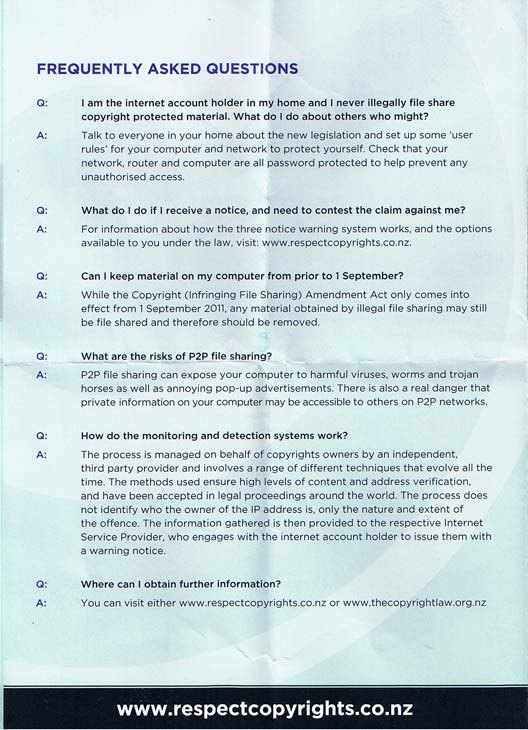 It contains some interesting content.
It contains some interesting content.
“While not required under the new law, illegally obtained copyright protected material may still be file shared and therefore should be removed.”
Read: buy the files you downloaded illegally in the past. Helpful advice would be to remove peer-to-peer software from your computer if you’re not using it, or to stop sharing illegally obtained material if you’re doing so (eg. stop seeding).
“P2P file sharing can expose your computer to harmful viruses, worms and trojan horses as well as annoying pop-up advertisements. There is also a real danger that private information on your computer may be accessible to others on P2P networks.”
Finding files through moderated sites (which can remove harmful torrents), reading the comments on torrents and having up-to-date anti-malware software all reduce this small risk of harm.
The “real danger” of private information being inadvertently shared is practically impossible with torrenting. LimeWire, FrostWire and friends were possibly deceptive about what user’s folders were actually being shared in the past, but now LimeWire is dead and FrostWire exclusively uses torrents, so it shouldn’t be a problem anymore.
But points for including the relatively unbiased URL of NetSafe’s The Copyright Law, albeit in tiny print down the very bottom on the back page.
This site is interesting, especially when you compare its list of legitimate places to buy movies and TV shows to the US version‘s list.
Our list for TV shows is basically the On Demand sites for the free-to-air TV stations, plus iSky. On the movies side we have iSky, the console networks and iTunes, which is also listed as having TV shows, but that’s not the case in New Zealand.
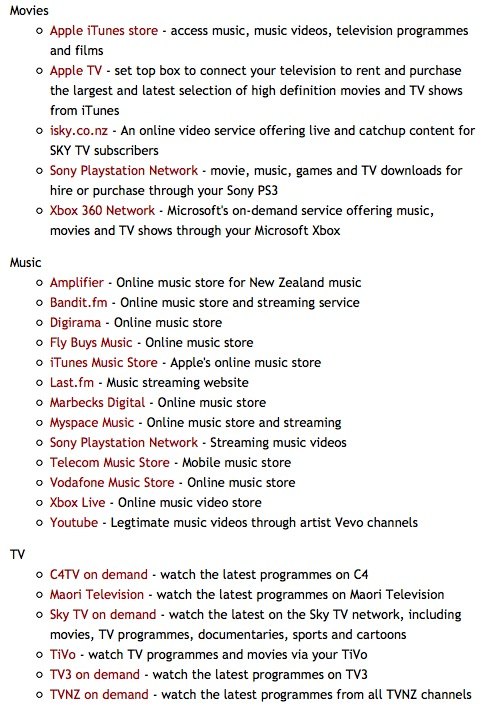
In comparison, the US site lists 43 legal alternatives, including iTunes (which you can actually get TV shows from in the US, or by using a US iTunes account), Hulu and Netflix.
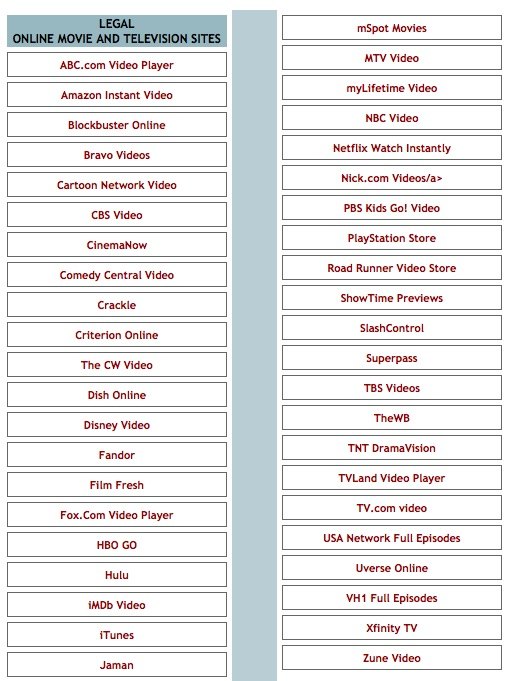
And the MPAA wonder why people illegally download movies and TV shows in New Zealand?
On a plus, Respect Copyrights has removed that ridiculous clause from their Terms of Use stating that no one was allowed to link to their site without their “express written permission”. Their grasp of the internet is growing!
Good news on the music front though. Music streaming subscription service Spotify is coming to Australia and New Zealand, possibly around February next year. The downside is that they’re now in bed with Facebook, so you’ll need a Facebook account to use it.
Jonathan Hunt and Lance Wiggs illustrate how inadequate the sites MPAA lists are. MPAA, NZFACT and friends love harping on how people pirating movies like Boy are harming our movie industry in New Zealand.
But you still can’t download it legally from iTunes.
And I wouldn’t count on it being added either. Remember Sione’s Wedding? You know, the movie released in 2006 that cost “its investors an estimated $1 million” because it was pirated?
It’s not in the New Zealand iTunes store five years later.

But of course, it’s in the US iTunes store as Samoan Wedding.

Nice one. Perhaps more kiwis would support their creative community, if, you know, you actually made it easy for them?